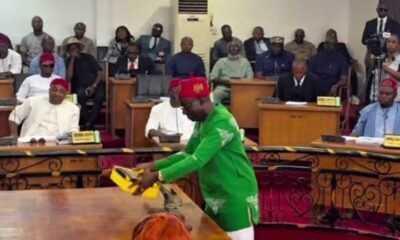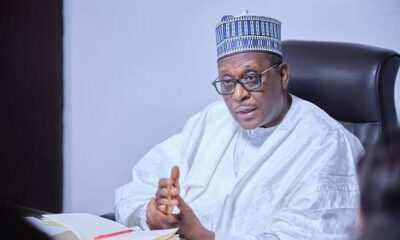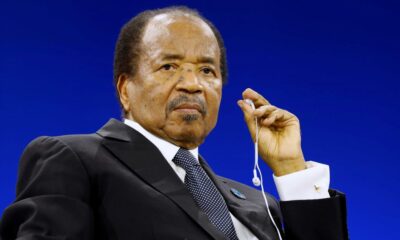Politics
China vows to fight US tariffs – but it also wants to talk
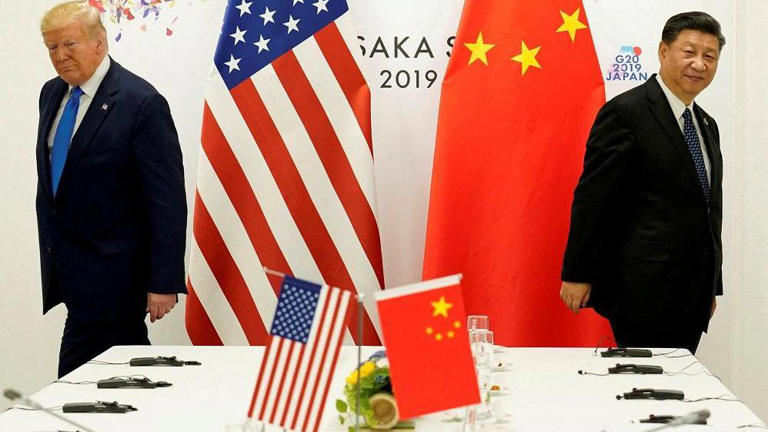
“China will fight to the bitter end of any trade war,” the foreign ministry spokesperson in Beijing declared, after China announced tit-for-tat tariffs on agricultural imports from the US.
This came within minutes of a new 10% US levy on Chinese imports that came into effect on Tuesday – which adds to existing tariffs both from Trump’s first term and those announced last month.
But China’s latest retaliatory measures are an opening swing, not a direct punch.
It shows some strength, and it has the potential to sting parts of the United States, but also leaves room to negotiate or escalate if necessary.
“We advise the US to put away it’s bullying face and return to the right track of dialogue and co-operation before it is too late,” foreign ministry spokesperson Lin Jian added.
This is the second round of tariffs the two countries have imposed on each other since February. But this time China is hitting Donald Trump where it has the potential to hurt – by targeting farmers, who are some of his core supporters.
Almost 78% of farming-dependent counties in the US endorsed Mr Trump in 2024.
China is one of their biggest customers for produce such as chicken, beef, pork and soybeans and now all those products will face a 10-15% tax which will come into effect on 10 March.
“The tariffs are broadly negative for US agricultural markets. It is going to have a bearish influence on prices. There are enough corn and soybean supplies in the world for China to make a switch, it is more of an issue for the US, because 30% of US soybeans still go to China,” Ole Houe, of Ikon commodities, told Reuters news agency.
Beijing may hope that this will apply some pressure on the Trump administration ahead of any potential negotiations.
The latest announcements raise the prospect of an all-out trade war between the world’s top two economies and in various ministry statements, China is making two things very clear.
Firstly, it is prepared to continue to fight.
“Pressure, coercion and threats are not the right way to deal with the Chinese side,” said Mr Lin.
But secondly, it is also willing to talk.
Beijing is not ramping up the rhetoric or the tariffs in the same way it did in 2018, during the last Trump administration. Back then it imposed a tariff of 25% on US soybeans.
“China’s tariffs impact a limited number of US products, and remain below the 20% level. This is by design. China’s government is signalling that they do not want to escalate, they want to de-escalate,” according to Even Pay, an analyst with Trivium China.
The prospect of talks was raised last month.
The White House said there would be a call between President Xi and Donald Trump. That never happened.
So will these talks take place and who will make the first move?
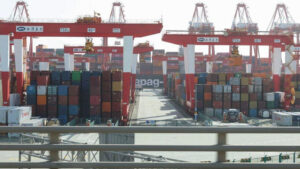
A new 10% US levy on Chinese imports that came into effect on Tuesday is likely to hurt Beijing
© Reuters
China is unlikely to want to go first. It will not want to be seen kowtowing to Washington.
And in contrast to Canada and Mexico, Beijing has not announced new measures to target the flow of fentanyl. It simply repeated past statements that fentanyl is a “US problem” and that China has the strictest drug policies in the world.
On Tuesday, the State Council released a White Paper entitled “Controlling Fentanyl-related substances – China’s contribution.”
It outlines the measures Beijing says it has already made to crack down on Fentanyl-related crimes and the precursor chemicals used to make the drug. It adds that it is “diligently fulfilling international drug control obligations”.
So, while China hasn’t picked up the phone to Washington, this document forms part of the country’s message which appears to be saying – we are already doing what we can on fentanyl.
Money worries
Despite stating that China “will not yield”, these latest tariffs are bound to sting.
The cumulative 20% tax on all Chinese goods comes on top of a slew of tariffs Trump imposed in his first term on tens of billions of dollars of Chinese imports. And China’s population is already concerned about a sluggish economy.
Thousands of delegates are gathering in the capital this week to take part in an annual parliamentary session, most of which will focus on the economy.
House prices are still falling, and youth unemployment remains stubbornly high. A potential trade war with the US could prompt more money worries for businesses and consumers across the country at a time when the Communist Party wants people to spend to help the economy to grow.
But Beijing will also see an opportunity as Donald Trump sows uncertainty among his international allies.
It can partly place the blame for any further economic woes at Washington’s door and state that it’s the fault of the US for starting a trade war.
The state media outlet Xinhua has in recent days released a series of parodies poking fun at a United States that is prepared to tax its allies and neighbours. The skits portray Washington as a bully echoing the words coming from the leaders of Canada and Mexico.
At the same time, China’s Commerce Ministry has reiterated that it is prepared to work with other countries around the world to combat Mr Trump’s tariffs.
Beijing appears to be looking for potential allies in this trade war while also trying to cast Washington as a troublemaker who is prepared to target friends and foes alike.
All at a time when Donald Trump’s ‘America First’ doctrine has many in Europe and the UK wondering if the US-led world order is already in doubt.
Politics
OHANAEZE YOUTH COUNCIL REPLIES NORTHERN ELDERS FORUM: YES, IGBO YOUTHS WANT BIAFRA

By Comrade Igboayaka O. Igboayaka
President OHANEZE YOUTH COUNCIL
The Ohanaeze Youth Council (OYC) has formally replied to the recent statement credited to the Northern Elders Forum, wherein they suggested that if Igbo youths truly desire Biafra, the Nigerian government should not stand in their way.
While we acknowledge this rare moment of honesty, OYC states clearly and unequivocally:-Yes — Igbo youths want Biafra. And this desire is not born out of hatred, but out of decades of injustice, exclusion, and systemic oppression.
The agitation for Biafra is the direct consequence of Nigeria’s persistent failure to build an equitable and inclusive federation.
WHY IGBO YOUTHS ARE DEMANDING BIAFRA
Our position is anchored on undeniable realities:-
*1. Political Differences:-Nigeria’s political structure has consistently marginalized the Southeast. Since the return to democracy in 1999, the Igbo nation has been deliberately excluded from key leadership positions, particularly the Presidency and critical security offices. Federal appointments, resource control, and political representation remain grossly imbalanced against Ndigbo.The so-called federal system operates more like a unitary arrangement where certain regions dominate while others are reduced to spectators.*
*2. Social Differences:-Social integration in Nigeria has collapsed. Igbo citizens face profiling, harassment, and selective enforcement of laws across different parts of the country. Peaceful protests in Igboland are met with military brutality, while violent extremism elsewhere often receives negotiation and amnesty.This double standard has deepened alienation among Igbo youths.*
*3. Cultural Differences:-Our language, traditions, and values are neither protected nor promoted within the Nigerian framework. Instead, Igbo culture is routinely undermined and treated as inferior. A nation that fails to respect the cultural identity of its people cannot claim unity.*
*4. Religious Differences:-Religious intolerance has become normalized. Christian communities in the Southeast feel increasingly threatened in a country where religious bias influences policy, security response, and governance. The absence of genuine religious neutrality further widens the divide.*
*5. Ethnic Hate Against Ndigbo:- Anti-Igbo rhetoric has been openly displayed in national discourse. From threats of expulsion to hate speeches and coordinated attacks, Ndigbo have become targets within their own country. Properties belonging to Igbos are often destroyed during crises, with little or no compensation or justice.This persistent hostility sends a clear message;we are not wanted.*
*6. Systemic Marginalization:- From abandoned federal roads to exclusion from major infrastructure projects, from poor seaport development to economic strangulation, the Southeast remains deliberately underdeveloped. Igbo youths graduate into unemployment, poverty, and despair while watching other regions benefit disproportionately from national resources.*
*This is not accidental. It is structural.*
*OUR MESSAGE IS SIMPLE*
*Igbo youths are not asking for war.*
*Igbo youths are asking for dignity.*
*Igbo youths are asking for freedom.*
*Igbo youths are asking for self-determination.*
*If Nigeria cannot guarantee justice, equity, and equal opportunity for all, then the call for Biafra becomes not just legitimate — but inevitable.*
*To the Northern Elders Forum: we appreciate your acknowledgment. Now let the Nigerian state also have the courage to respect the democratic will of a people.*

*You cannot force unity where there is no justice.*
*Powered by OHANAEZE YOUTH COUNCIL (OYC)*
Politics
FULL LIST: Nigeria now has 21 registered political parties
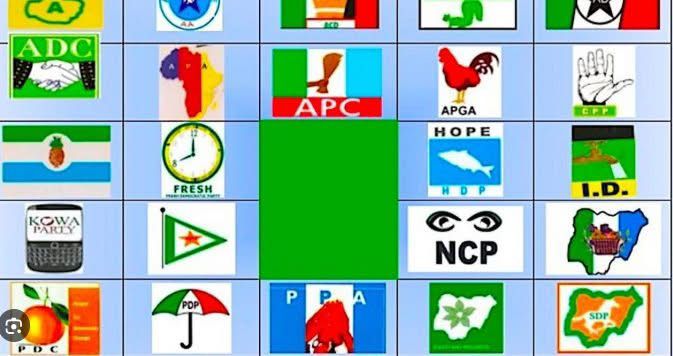
The Independent National Electoral Commission (INEC) has approved two new political parties ahead of the 2027 general elections, raising the total number of registered parties in Nigeria to 21.
INEC Chairman, Prof. Joash Amupitan (SAN), announced the approval of the Democratic Leadership Alliance (DLA) and the Nigeria Democratic Congress (NDC) in Abuja on Thursday. While DLA met all statutory requirements, NDC was registered following a Federal High Court order.
Full list of registered political parties in Nigeria:
All Progressives Congress (APC)
Peoples Democratic Party (PDP)
Accord (A)
Social Democratic Party (SDP)
Labour Party (LP)
All Progressives Grand Alliance (APGA)
African Democratic Congress (ADC)
Boot Party (BP)
Action Democratic Party (ADP)
African Action Congress (AAC)
Action Alliance (AA)
National Rescue Movement (NRM)
Zenith Labour Party (ZLP)
New Nigeria Peoples Party (NNPP)
Allied Peoples Movement (APM)
Peoples Redemption Party (PRP)
Action Peoples Party (APP)
Young Progressives Party (YPP)
Youth Party (YP)
Democratic Leadership Alliance (DLA) – new
Nigeria Democratic Congress (NDC) – new
INEC said the new parties were registered as part of efforts to deepen democratic participation and broaden political choices for Nigerians.
Politics
Nnamdi Kanu appeals conviction, faults terrorism trial
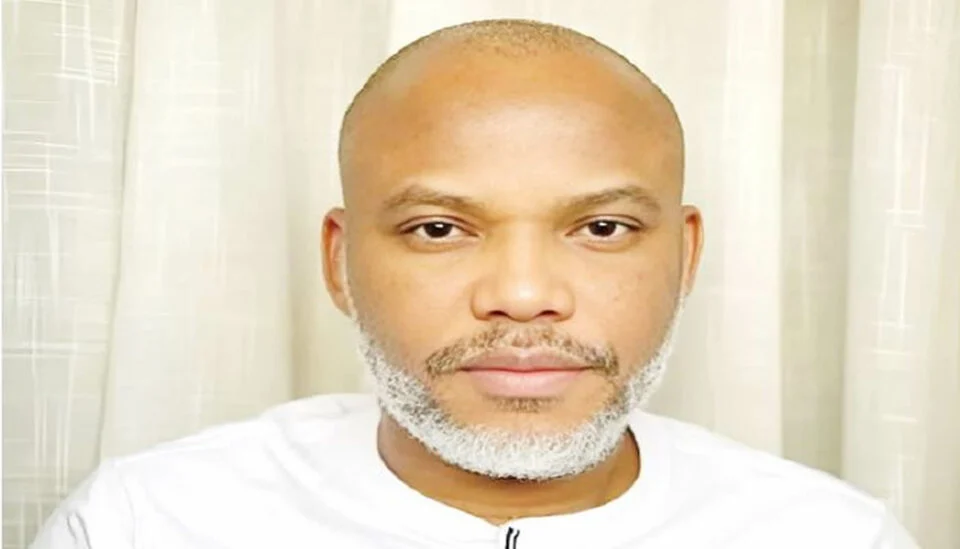
The detained leader of the Indigenous People of Biafra, Nnamdi Kanu, has filed a notice of appeal challenging his conviction and multiple sentences imposed by the Federal High Court in Abuja, insisting that the trial was riddled with fundamental legal errors and amounted to a miscarriage of justice.
In the notice of appeal dated February 4, 2026, Kanu said he was appealing against his conviction and sentences on seven counts, including terrorism-related offences, for which he received five life sentences and additional prison terms after being found guilty on November 20, 2025.
“I, Nnamdi Kanu, the Appellant, having been convicted and sentenced… do hereby give notice of appeal against my conviction,” the document stated.
Kanu was convicted for offences including “committing an act preparatory to or in furtherance of an act of terrorism,” “making a broadcast… with intent to intimidate the population,” and “being the leader and member of the Indigenous People of Biafra (IPOB), a proscribed organisation in Nigeria,” among others.
Justice James Omotosho of the Federal High Court, Abuja, delivered the judgment on November 20, 2025, sentencing Kanu to five life terms for terrorism-related offences, 20 years’ imprisonment for being the leader of the proscribed IPOB, and five years’ imprisonment with no option of fine for importing a radio transmitter without a licence.
In his grounds of appeal, the IPOB leader accused the trial court of failing to resolve what he described as a “foundational disruption of the original trial process” following the 2017 military operation at his Afara-Ukwu residence.
“The learned trial judge erred in law by failing to resolve the procedural and competence consequences of the foundational disruption of the original trial process in September 2017,” Kanu argued.
He also contended that the court proceeded to trial and judgment while his preliminary objection challenging the competence of the proceedings remained unresolved.
“The learned trial judge did not hear or determine the objection,” the appeal document stated, adding that judgment was delivered “while the objection remained pending and undetermined.”
Kanu further faulted the court for delivering judgment while his bail application was still pending, arguing that this affected the fairness of the trial process.
He also claimed that the trial court convicted him under a law that had already been repealed, stating that “the learned trial judge erred in law by convicting and sentencing the Appellant under the Terrorism Prevention (Amendment) Act, 2013, notwithstanding its repeal by the Terrorism (Prevention and Prohibition) Act, 2022, prior to judgment.”
Kanu further argued that he was subjected to double jeopardy, contrary to Section 36(9) of the 1999 Constitution, after being retried on facts he said had earlier been nullified by the Court of Appeal.
He also complained that he was denied fair hearing, claiming that he was not allowed to file or present a final written address before judgment was delivered.
Among the reliefs sought, Kanu asked the Court of Appeal to allow the appeal, quash his conviction and sentences, and “discharge and acquit the Appellant in respect of all the counts.”
He also informed the appellate court of his desire to be present at the hearing of the appeal, stating, “I want to be present at the hearing of the appeal because I may be conducting the appeal in person.”
Kanu is currently being held at a correctional facility in Sokoto State, after his application to be transferred to a different facility in either Niger or Nasarawa State was denied.
-
Business1 year ago
US court acquits Air Peace boss, slams Mayfield $4000 fine
-

 Trending1 year ago
Trending1 year agoNYA demands release of ‘abducted’ Imo chairman, preaches good governance
-

 Politics1 year ago
Politics1 year agoMexico’s new president causes concern just weeks before the US elections
-

 Politics1 year ago
Politics1 year agoPutin invites 20 world leaders
-

 Politics1 year ago
Politics1 year agoRussia bans imports of agro-products from Kazakhstan after refusal to join BRICS
-
Entertainment1 year ago
Bobrisky falls ill in police custody, rushed to hospital
-
Entertainment1 year ago
Bobrisky transferred from Immigration to FCID, spends night behind bars
-
Education1 year ago
GOVERNOR FUBARA APPOINTS COUNCIL MEMBERS FOR KEN SARO-WIWA POLYTECHNIC BORI







